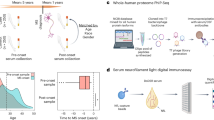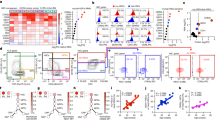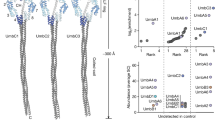Abstract
EXTRACTS of some varieties of the bean Phaseolus vulgaris can agglutinate erythrocytes1, precipitate human cell homogenates and serum proteins2, stimulate mitosis in leucocytes3, alter the sensitivity of leucocytes to cytotoxic agents and radiation4,5, and stimulate leucocytes in vitro to produce gamma globulin6. A commercially prepared extract of Phaseolus vulgaris, derived according to the method of Rigas and Osgood7, is available as phytohaemagglutinin (PHA-M, Difco Laboratories, Detroit, Michigan). This preparation, which is apparently a mixture of proteins8, is frequently used as a mitogenic agent for in vitro leucocyte cultures. Some of its antigenic properties have already been reported9.
This is a preview of subscription content, access via your institution
Access options
Subscribe to this journal
Receive 51 print issues and online access
$199.00 per year
only $3.90 per issue
Buy this article
- Purchase on Springer Link
- Instant access to full article PDF
Prices may be subject to local taxes which are calculated during checkout
Similar content being viewed by others
References
Li, J. G., and Osgood, E. E., Blood, 4, 670 (1949).
Beckman, L., Nature, 195, 582 (1962).
Nowell, P. C., Cancer Res., 20, 462 (1960).
Schrek, R., and Stefani, S., J. Nat. Cancer Inst., 32, 507 (1964).
Stefani, S., and Schrek, R., J. Lab. and Clin. Med., 63, 1027 (1964).
Hirschhorn, K., Bach, F., Kolodny, R. L., Firschein, I. L., and Hashem, N., Science, 142, 1185 (1963).
Rigas, D. A., and Osgood, E. E., J. Biol. Chem., 212, 607 (1955).
Robbins, J. H., and Wachtel, A. W., Lancet, ii, 406 (1963).
Byrd, W. J., Finley, W. H., Finley, S. C., McClure, S., Lancet, ii, 420 (1964).
Pearmain, G., Lycette, R. R., and Fitzgerald, P. H., Lancet, i, 637 (1963).
Robbins, J. H., Science, 146, 1948 (1964).
Gräsbeck, R., Nordman, C., de la Chapelle, A., Lancet, ii, 385 (1963).
Farnes, P., Barker, B. E., Brownhill, L. E., and Fanger, H., Lancet, ii, 1100 (1964).
Hastings, J., Freedman, S., Randon, O., Cooper, H. L., and Hirschhorn, K., Nature, 192, 1214 (1961).
Moorhead, P. S., Nowell, P. C., Mellman, W. J., Battips, D. M., and Hungerford, D. A., Exp. Cell Res., 20, 613 (1960).
Riggs, J. L., Siewald, R. J., Burckhalter, J. H., Downs, C. M., and Metcalf, T. G., Amer. J. Path., 34, 1081 (1958).
Michalowski, A., Jansinska, J., Brozosko, W. J., and Nowoslawski, A., Exp. Cell Res., 34, 417 (1964).
Author information
Authors and Affiliations
Rights and permissions
About this article
Cite this article
BYRD, W., HARE, K., FINLEY, W. et al. Inhibition of the Mitogenic Factor in Phytohaemagglutinin by an Antiserum. Nature 213, 622–624 (1967). https://doi.org/10.1038/213622a0
Published:
Issue Date:
DOI: https://doi.org/10.1038/213622a0
This article is cited by
-
Intracutanteste mit Phytoh�magglutinin (PHA)
Archives for Dermatological Research (1976)
-
Effect of Phytohaemagglutinin on the Surface Charge of Human and Murine Lymphocytes
Nature (1967)
Comments
By submitting a comment you agree to abide by our Terms and Community Guidelines. If you find something abusive or that does not comply with our terms or guidelines please flag it as inappropriate.



